Russell Group universities now use interviews simply as a marketing opportunity, says headteacher

Russell Group universities are now using interviews as a marketing opportunity rather than as a way to pick the best candidates, a leading headteacher has said.
Previously, only tutors selecting candidates for competitive courses at the most selective institutions would invite students for an interview.
But now it is the universities that are “struggling to fill places” that ask pupils to come for an interview as a way to “entice” them into selecting it as their first choice.
Liz Hewer, headmistress at school St George’s Ascot, said: “If you get asked for interview you are going to say yes if it’s one of your five choices. But it definitely feels, from the feedback from the pupils, like a marketing day.”
“It’s ‘come and have a look and meet us, we have an opportunity to show you what a great place this is as well as having an interview’.
“Whereas in the past it would only really be for the very competitive courses or particular subjects like medicine which would require an interview.”
St George’s Ascot, which costs £36,525-a-year for boarders, was founded in 1877 as a boys’ preparatory school and its alumni include the former Prime Minister Winston Churchill. It later became an all-girls’ school and counts Princess Beatrice among its more recent former pupils.
Since the lifting of the cap on numbers in 2015, many universities have rapidly expanded and are now competing with each other to recruit as many students as possible.
Universities have also been criticised for using “incentivised” unconditional offers to effectively bribe students into choosing them as their first choice.
The number of unconditional offers has risen sharply in recent years, with students now 30 times more likely to receive one than five years ago.
Fierce competition between universities to attract students has seen sixth form pupils increasingly offered places regardless of their exam results.
Some institutions hand out incentivised offers - known as "conditional unconditional" offers - where they tell students that their offer will be unconditional but only if they accept it as their first choice university.
The universities watchdog has previously warned that applying "psychological pressure" or "creating an impression of urgency" in decision making could be a potential breach of consumer protection law.

 Yahoo News
Yahoo News 
